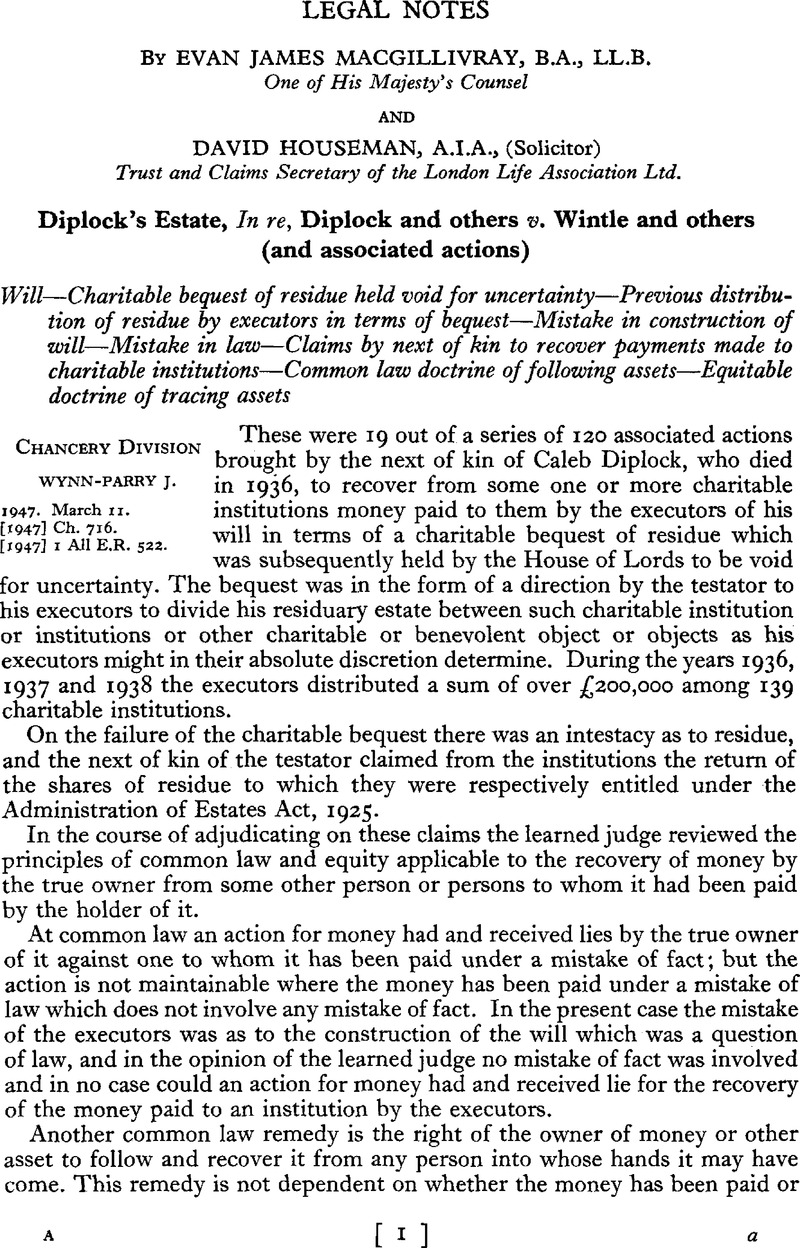Article contents
Legal notes
Published online by Cambridge University Press: 18 August 2016
Abstract

- Type
- Other
- Information
- Copyright
- Copyright © Institute and Faculty of Actuaries 1948
References
Notes
Appeal:
Inland Revenue Comissioners v. Wesleyan and General Assurance Society, Vol. LXXIII, p. [13]; [1948] 1 All E. R. 555; 64 T.L.R. 173. The House of Lords (Viscount Simon and Lords Porter, Uthwatt, du Parcq and Oaksey) unanimously upheld the decision of the Court of Appeal. Viscount Simon emphasized two propositions well established in the application of the law relating to income tax as follows:
-
(i)
(i) The name given to a transaction by the parties concerned does not necessarily decide the nature of the transaction. To call a payment a loan if it is really an annuity does not assist the taxpayer any more than to call an item a capital payment would prevent it from being regarded as an income payment if that is its true nature.
-
(ii)
(ii) A transaction which, on its true construction, is of a kind that would escape tax is not taxable on the ground that the same result could be brought about by a transaction in another form which would attract tax.
He quoted with approval the following passage from the judgment of Lord Greene M.R.:
‘In dealing with income tax questions it frequently happens that there are two methods at least of achieving a particular financial result. If one of those methods is adopted, tax will be payable. If the other method is adopted, tax will not be payable…. The net result, from the financial point of view, is precisely the same in each case, but one method of achieving it attracts tax and the other method does not. There have been cases in the past where what has been called “the substance of the transaction” has been thought to enable the court to construe a document in such a way as to attract tax. That particular doctrine of substance, as distinct from form, was, I hope, finally exploded by the decision of the House of Lords in The Duke of Westminster v. Inland Revenue Commissioners [1936] A.C. 1.
In re Waring (deceased), Westminster Bank Ltd. v. Burton-Butler and others, [1948] 1 All E. R. 257. As a result of the decision by the House of Lords in Berkeley v. Berkeley Vol. LXXIII; p. [12], a further summons was brought in respect of the will of J. A. Waring who died on 3 August 1940. The first summons is reported at [1942] Ch. 309 and mentioned in Vol. LXXI at P. 447.
The Finance Act, 1941, s. 25, reduced the quantum where provision is made for an annuity free of income tax if (inter alia) such provision was made before 3 September 1939: and in Berkeley v. Berkeley the House of Lords, reversing the decision of the Court of Appeal in In re Waring, held that, in the case of a will, such provision is made at the date of death and not at the date of the will.
In In re Waring there were two such annuities given to H. B. Burton-Butler and Mrs L. Burton-Butler respectively: but in the previous application to the Court Mrs Burton-Butler was not a party. She was abroad and not available but, although the Court was asked to make a representation order to bind her, it refused to do so.
If the position of the annuity to H. B. Burton-Butler had now been brought before the Court de novo the Court would have had to follow Berkeley v. Berkeley: but it was clear that on the well recognized principle of res judicata it was bound by the previous decision and that the quantum of his annuity must be treated as irretrievably fixed. Mrs Burton-Butler was, however, in a different position and (anomalous as the result might appear to be) her annuity must be paid in full.
- 1
- Cited by


